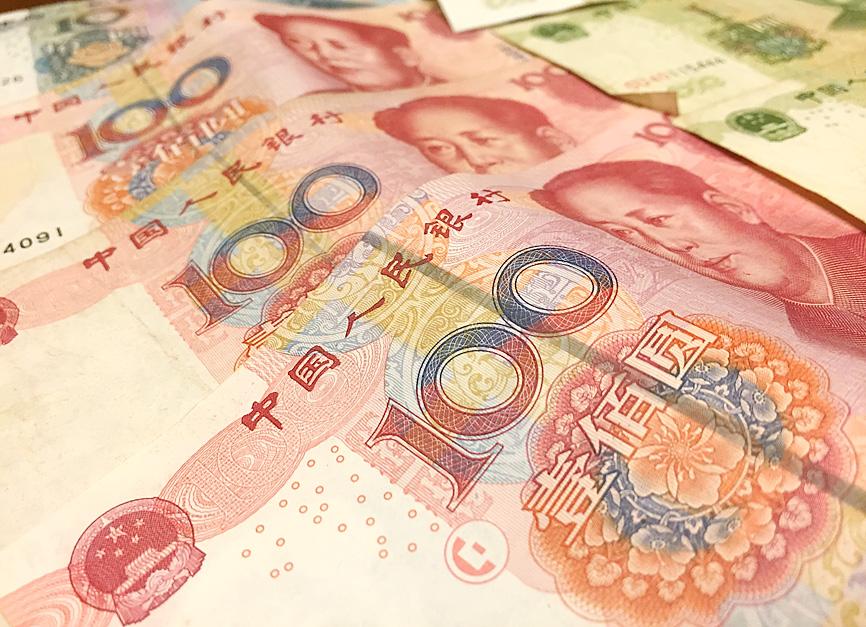Yuan deposits held by local banks last month increased by 1.34 percent to 241.24 billion yuan (US$37.23 billion), ending three months of decline, after corporate investors raised holdings, but individuals trimmed positions, the central bank said on Thursday.
Yuan deposits increased by 1.23 percent to 208.84 billion yuan at domestic banking units, while climbing by 2.03 percent to 32.39 billion yuan at offshore banking units, central bank Department of Foreign Exchange Deputy Director-General Gloria Chen (陳婉寧) told an online news conference in Taipei.
Chen attributed the advance at domestic units to bond redemptions by local insurance companies and the increase at offshore units to account receivables by local electronics firms.

Photo: Kelson Wang, Taipei Times
Five yuan-denominated bonds were each worth 4.95 billion yuan or more last month, while two new bonds entered the market, raising 3.85 billion yuan, Chen said.
However, retail investors continued to cut yuan deposits in favor of new yuan funds that promise higher yields, she said.
The People’s Bank of China last week announced that it would lower reserve requirement ratios by 0.5 percentage points, which is believed to inject 1 trillion yuan into the financial system to help support China’s economic growth, but might bode ill for investors reliant on interest incomes.
Bank of China Ltd’s (中國銀行) Taipei branch lowered interest rates for deposits of several tenures by 0.1 to 0.27 percentage points.
Bank SinoPac (永豐銀行) is offering the highest interest rate among its peers of 3.05 percent for one-month yuan deposits, while the Bank of Kaohsiung (高雄銀行) has the highest interest rate of 1.65 percent for three-month yuan deposits, Chen said.

Taiwanese suppliers to Taiwan Semiconductor Manufacturing Co. (TSMC, 台積電) are expected to follow the contract chipmaker’s step to invest in the US, but their relocation may be seven to eight years away, Minister of Economic Affairs J.W. Kuo (郭智輝) said yesterday. When asked by opposition Chinese Nationalist Party (KMT) Legislator Niu Hsu-ting (牛煦庭) in the legislature about growing concerns that TSMC’s huge investments in the US will prompt its suppliers to follow suit, Kuo said based on the chipmaker’s current limited production volume, it is unlikely to lead its supply chain to go there for now. “Unless TSMC completes its planned six

Power supply and electronic components maker Delta Electronics Inc (台達電) yesterday said second-quarter revenue is expected to surpass the first quarter, which rose 30 percent year-on-year to NT$118.92 billion (US$3.71 billion). Revenue this quarter is likely to grow, as US clients have front-loaded orders ahead of US President Donald Trump’s planned tariffs on Taiwanese goods, Delta chairman Ping Cheng (鄭平) said at an earnings conference in Taipei, referring to the 90-day pause in tariff implementation Trump announced on April 9. While situations in the third and fourth quarters remain unclear, “We will not halt our long-term deployments and do not plan to

‘SHORT TERM’: The local currency would likely remain strong in the near term, driven by anticipated US trade pressure, capital inflows and expectations of a US Fed rate cut The US dollar is expected to fall below NT$30 in the near term, as traders anticipate increased pressure from Washington for Taiwan to allow the New Taiwan dollar to appreciate, Cathay United Bank (國泰世華銀行) chief economist Lin Chi-chao (林啟超) said. Following a sharp drop in the greenback against the NT dollar on Friday, Lin told the Central News Agency that the local currency is likely to remain strong in the short term, driven in part by market psychology surrounding anticipated US policy pressure. On Friday, the US dollar fell NT$0.953, or 3.07 percent, closing at NT$31.064 — its lowest level since Jan.

The New Taiwan dollar and Taiwanese stocks surged on signs that trade tensions between the world’s top two economies might start easing and as US tech earnings boosted the outlook of the nation’s semiconductor exports. The NT dollar strengthened as much as 3.8 percent versus the US dollar to 30.815, the biggest intraday gain since January 2011, closing at NT$31.064. The benchmark TAIEX jumped 2.73 percent to outperform the region’s equity gauges. Outlook for global trade improved after China said it is assessing possible trade talks with the US, providing a boost for the nation’s currency and shares. As the NT dollar